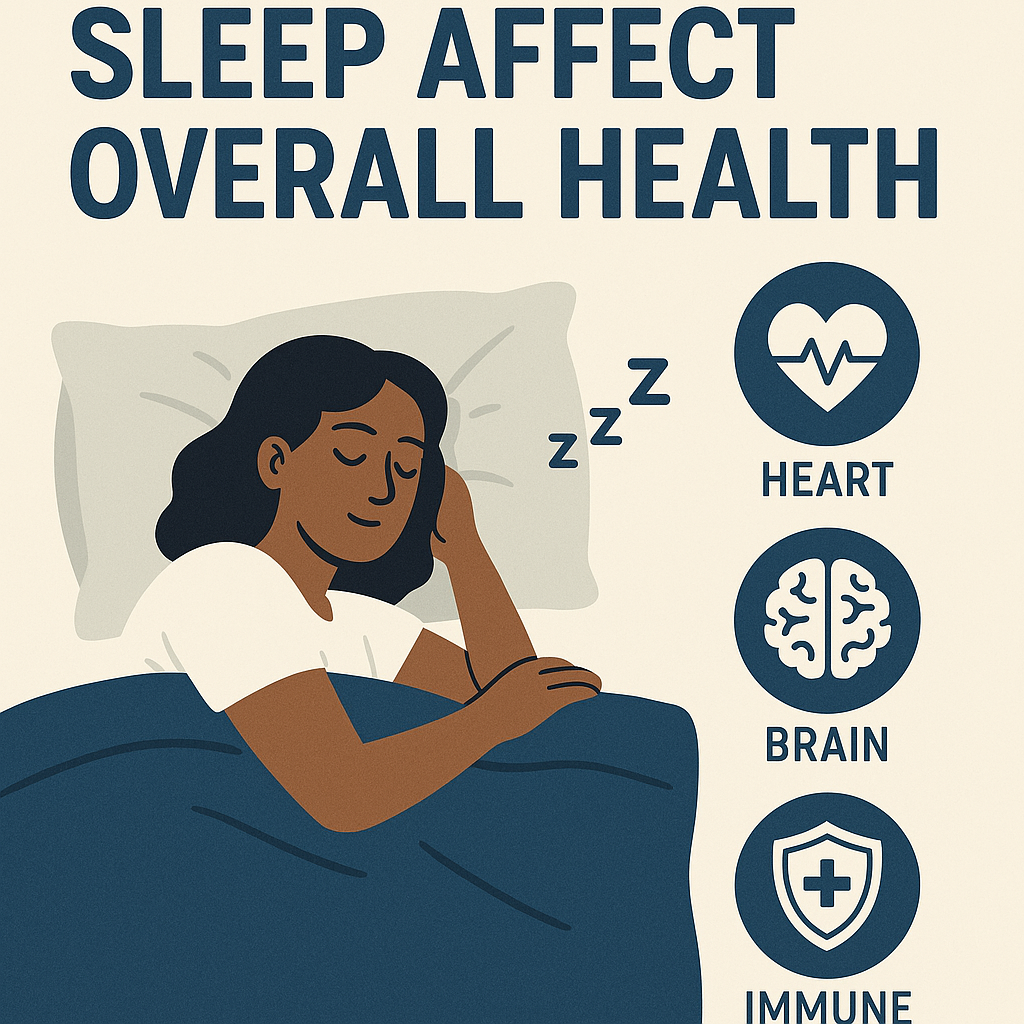How Does Sleep Affect Overall Health?

Sleep is a fundamental biological process essential for maintaining physical health and overall well-being. Despite its importance, sleep deprivation has become a widespread public health issue in Australia, with research indicating that nearly 40% of adults regularly experience inadequate sleep (Parliament of Australia, n.d.). Poor sleep has been linked to an increased risk of chronic diseases such as cardiovascular disease, diabetes, and obesity.
The Sleep Health Foundation’s national survey found that 33-45% of Australian adults report insufficient or poor-quality sleep, with 8% diagnosed with sleep apnea, 20% experiencing significant insomnia, and 18% reporting symptoms of restless legs syndrome (Sleep Health Foundation, 2017). Additionally, young Australians are facing growing sleep challenges, with 30% of young adults sleeping less than the recommended seven to nine hours per night, and 25% rating their sleep quality as “fairly bad” or “very bad” (University of the Sunshine Coast, 2023). These statistics highlight the urgent need for greater awareness and intervention to improve sleep health across the country.
This article explores the critical role of sleep in maintaining physical health, with a particular focus on chronic disease risk, cardiovascular health, and metabolic function.
The Importance of Sleep
Sleep is essential for restoring the body, supporting immune function, and regulating metabolic processes. According to the Better Health Channel (n.d.), sleep is as vital to human survival as food, water, and oxygen. During sleep, the body undergoes cellular repair, muscle growth, and memory consolidation, all of which are essential for long-term health.
Despite these benefits, a significant proportion of Australians do not get the recommended amount of sleep. Factors such as shift work, increased screen time, high stress levels, and poor sleep hygiene contribute to widespread sleep deprivation. Chronic sleep loss has been linked to impaired cognitive function, reduced immunity, and increased risk of lifestyle-related diseases (Better Health Channel, n.d.). Addressing sleep issues through lifestyle modifications and public health initiatives is crucial in mitigating the long-term consequences of sleep deprivation.
Sleep and Cardiovascular Health
Numerous studies have linked insufficient sleep to an increased risk of cardiovascular disease. The Australian Institute of Health and Welfare (AIHW) (n.d.) reports that both insufficient and excessive sleep are associated with higher risks of coronary heart disease, stroke, and hypertension. Sleep deprivation contributes to elevated blood pressure, increased inflammation, and higher cortisol levels, all of which negatively impact heart health.
A recent study found that nearly one-third of Australians do not get enough sleep, with almost half experiencing chronic sleep disturbances (The Australian, 2025). Prolonged sleep deficits are associated with an increased risk of heart attacks, heart failure, and irregular heart rhythms. The Sleep Health Foundation (2017) found that individuals who consistently sleep fewer than six hours per night are at a 48% higher risk of developing heart disease. Additionally, irregular sleep patterns can increase the likelihood of stroke and cardiovascular events by up to 26% (The Australian, 2025).
Sleep and Metabolic Health
Poor sleep quality has significant effects on metabolic function. Sleep plays a critical role in regulating glucose metabolism, insulin sensitivity, and appetite hormones. The AIHW (n.d.) reports that inadequate sleep is associated with an increased risk of type 2 diabetes and obesity.
Chronic sleep deprivation leads to an imbalance in hunger-related hormones, such as leptin and ghrelin, which regulate appetite. Research has shown that people who consistently get less sleep tend to consume higher-calorie diets and have a higher likelihood of weight gain (Sleep Health Foundation, 2017). Furthermore, insufficient sleep disrupts glucose metabolism, increasing insulin resistance and contributing to a higher risk of developing type 2 diabetes.
Sleep and Immune Function
Sleep is crucial for maintaining a healthy immune system. Studies have shown that individuals who experience chronic sleep deprivation are more susceptible to infections, take longer to recover from illnesses, and may have a weakened response to vaccinations (Better Health Channel, n.d.). The body’s immune system relies on sleep to produce cytokines, proteins that help fight off infections and inflammation. Without adequate sleep, the production of these immune-supporting molecules is reduced, leaving the body more vulnerable to illness.
Conclusion
Sleep is a vital component of overall health, influencing cardiovascular function, metabolic processes, and immune response. In Australia, a significant proportion of the population experiences sleep deprivation, contributing to increased risks of chronic diseases such as heart disease, diabetes, and obesity. Addressing sleep issues through public awareness, lifestyle modifications, and better sleep hygiene can lead to significant improvements in health outcomes.
For Australians looking to enhance their sleep quality, optimising their sleep environment is essential. Using sleep accessories such as 3D eye masks and earplugs can help block out light and noise, promoting deeper and more restorative sleep. Given the substantial evidence linking poor sleep to adverse health outcomes, prioritising sleep should be a key focus for individuals and policymakers alike.
References
Australian Institute of Health and Welfare (n.d.). Sleep problems as a risk factor. Retrieved from https://www.aihw.gov.au/reports/risk-factors/sleep-problems-as-a-risk-factor/summary
Better Health Channel (n.d.). Sleep explained. Retrieved from https://www.betterhealth.vic.gov.au/health/conditionsandtreatments/sleep
Parliament of Australia (n.d.). Bedtime reading: Inquiry into sleep health awareness in Australia. Retrieved from https://www.aph.gov.au/Parliamentary_Business/Committees/House/Health_Aged_Care_and_Sport/SleepHealthAwareness/Report
Sleep Health Foundation (2017). Asleep on the job: Costs of inadequate sleep in Australia. Retrieved from https://www.sleephealthfoundation.org.au/pdfs/Asleep_on_the_job/Asleep_on_the_Job_SHF_report-WEB_small.pdf
The Australian (2025, February 5). How much sleep do you need to stay heart healthy? Retrieved from https://www.theaustralian.com.au/health/how-much-sleep-do-you-need-to-stay-heart-healthy/news-story/de4b40eb3f8f26a63afee8dc4c8aa0df
University of the Sunshine Coast (2023, July). 1 in 4 young Australians aren’t satisfied with their sleep. Retrieved from https://www.usc.edu.au/about/unisc-news/news-archive/2023/july/1-in-4-young-australians-aren-t-satisfied-with-their-sleep



